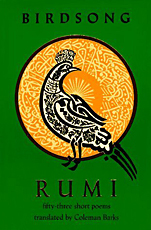Some of the most quoted and beloved of Rumi's poems are his "quatrains," outstanding examples of the four-line poem form indigenous to the Persian language. Coleman Barks, who has translated many of them, says their playfulness and variety remind him of birdsong. To us, they rival the haiku form in their ability to catch a mood and a meaning in the present moment.
- You're the spring.
We're grasses trailing in it.
You're the king coming by.
We're beggars along the road.
You're the voice we're echoes of.
You're calling for us now.
How could we not return?
- Lo I am with you always,
you promised that,
and when I realized it was true,
my soul flared up.
Any unhappiness comes from forgetting.
Remember, and be back close
with the Friend.
- Birdsong brings relief
to my longing.
I am just as ecstatic as they are,
but with nothing to say!
Please, universal soul, practice
some song, or something, through me!
- Birds make great sky-circles
of their freedom.
How do they learn it?
They fall, and falling,
they're given wings.
